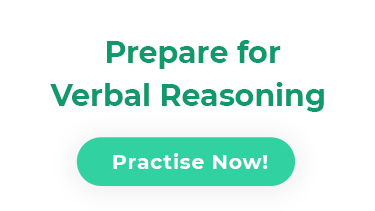A verbal reasoning test will evaluate your ability to communicate using the English language. Whether you’re a police officer reading a report, an executive giving a presentation, or a lawyer writing a brief, you’ll need to communicate at some point in some way during your professional career.
Many employers choose to administer verbal reasoning tests to interested applicants. These screening exams help hiring managers to see how thoroughly potential new employees analyse texts and how precisely they can articulate their thoughts.
What Is Verbal Reasoning?
Verbal reasoning is a fairly ambiguous term, but when it comes to psychometric exams, it refers, very basically, to your ability to use language effectively. A verbal reasoning test isn’t much different than the SAT’s in format. You’ll be asked to define words both in and out of context, identify grammatical errors, and answer questions about various texts.
How to Prepare for a Verbal Reasoning Test?
If you read the newspaper and edit your emails before sending them to colleagues and co-workers, chances are good that you already know a good deal about how to communicate effectively. However, you’ll still probably want to send some time preparing if you need to take a verbal reasoning test.
Verbal reasoning questions aren’t necessarily straightforward. If you’re haven’t taken a standardised language test before, you may find yourself falling into their traps.
Types of Questions:
There are four types of questions on verbal reasoning tests: reading comprehension, true/false, vocabulary, and grammar questions. Here’s what you should expect.
Reading Comprehension
You’ll be given a short passage followed by several comprehension questions. In many cases, the text or extract will pertain to your industry; however, that won’t necessarily be the case. The questions will ask you to recall details from the passage, summarise general themes, infer the author’s purpose, and compare various ideas presented. You may also be asked to analyse the author’s argument or state whether the text does or does not support a certain conclusion either implicitly or explicitly.
Vocabulary
Vocabulary questions will ask you to either give you a word and ask you to define it or identify a word in a passage and ask you to choose the relevant meaning out of a few possible choices. In the first case, you’ll simply have to draw upon your previous knowledge. In the second case, you’ll need to use context clues to determine the significance of the word specifically as it’s used in the sentence. Alternatively, you could be asked to rearrange words in a sentence or complete analogies.
Grammar
You can’t fool yourself into thinking that grammar is irrelevant in the twenty-first century. Grammar is the backbone of any language, and you need to have a strong grasp of even the technical aspects of language if you want to be taken seriously in the professional world.
These questions will test your knowledge of punctuation, capitalisation, spelling, and sentence structure. Sometimes you’ll be given a sentence with an error and asked to identify the mistake. Other times you’ll be given four different sentences and asked to choose the one that’s written correctly.
Final Thoughts: Verbal Reasoning Tests:
Preparing for a verbal reasoning test? Don’t sweat it! Verbal reasoning can be tricky, but with a little practice, you’ll get the hang of it. Make sure to click over to our practice tab to try your hand at some review questions before heading out to the assessment centre.

